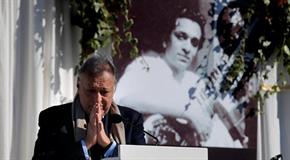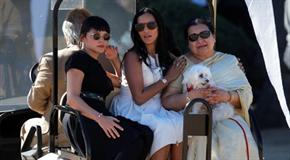
Daily Pulse
Get Pollstar News and more delivered right to your inbox with Pollstar Daily Pulse.
By signing up, you agree to Pollstar’s Privacy Policy and Terms of Use

Get Pollstar News and more delivered right to your inbox with Pollstar Daily Pulse.
By signing up, you agree to Pollstar’s Privacy Policy and Terms of Use

Olivia Harrison said Shankar helped her late husband George Harrison achieve a more meaningful life when he was a young Beatle.
“They were like father and son as well as brothers,” Harrison said on an outdoor stage decorated with garlands of white flowers at the Self Realization Fellowship center in Encinitas, the oceanfront suburb north of San Diego where Shankar lived for the last two decades.
Shankar died last week in San Diego at age 92.
His wife, Sukanya Rajan, and daughters – singer Norah Jones and Grammy-nominated sitarist Anoushka Shankar – sat in the front row as speakers paid tribute. The audience listened to clips of Shankar’s music and recorded voice.
“Music is the only language I really know,” Shankar said in one clip.
Under blue skies on a warm Southern California morning, a family friend read messages from political and cultural luminaries including musicians Philip Glass and Peter Gabriel, who thanked him for teaching them. The audience heard excerpts from newspaper stories that trumpeted Shankar’s enormous influence.
Labeled “the godfather of world music” by Harrison, Shankar helped millions of Westerners – classical, jazz and rock lovers – discover the centuries-old traditions of Indian music. From Harrison to John Coltrane, from Yehudi Menuhin to Andre Previn, he bridged the musical gap between East and West.
Pirashanna Thevarajah, one of his students, said Shankar was the reason he pursued a music career and that his teacher sometimes believed more in him than he believed in himself. He called Shankar “a very simple soul with a wonderful sense of humor.”
Thevarajah said Shankar followed his puns with the line, “That’s why the call me a pundit.”
Film director Joe Wright, Shankar’s son-in-law, recalled a risky medical operation that Shankar’s family was unsure he would survive. Though he made it through, Wright thought he might never again see Shankar alive as he was rolled into the operating room.

Wright saw Shankar’s fingers moving as he was wheeled away.
“I never at any moment saw his fingers not playing, not beating a rhythm,” Wright said
 Daily Pulse
Subscribe
Daily Pulse
Subscribe